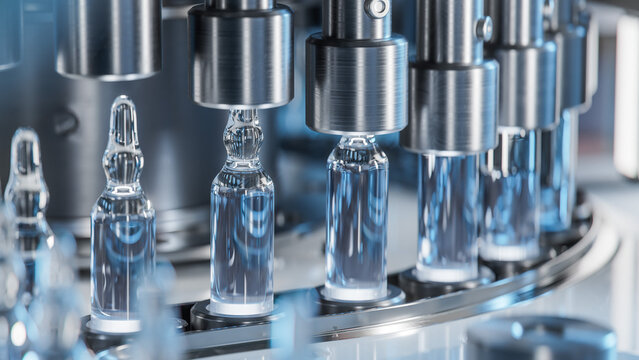Introduction
In pharmaceutical production, maintaining precise temperature control is essential for ensuring the quality, safety, and efficacy of medicines and other pharmaceutical products. Chillers play a critical role in this process, providing reliable cooling solutions across various stages of production, from formulation and mixing to storage and packaging. Selecting the right chiller is crucial for achieving optimal performance, complying with regulatory standards, and supporting sustainable operations. This guide provides key insights into choosing the best chiller for pharmaceutical production, addressing factors like temperature precision, reliability, energy efficiency, and compliance.Industrial Chillers
Temperature Precision and Control
- High-Precision Cooling: Pharmaceutical processes often require highly precise temperature control, as even slight variations can affect product stability. Choose a chiller that offers tight temperature regulation, typically within ±0.5°C or better.
- Advanced Control Systems: Look for chillers with sophisticated control systems that allow real-time monitoring, remote access, and precise adjustments to ensure consistent cooling performance.
Cooling Capacity and Load Requirements
- Calculate Cooling Load: Determine the cooling load by assessing the heat generated by equipment, processes, and environmental factors. Ensure that the selected chiller has sufficient capacity to handle peak cooling demands without compromising performance.
- Scalability for Future Needs: Consider chillers that allow for scalability, enabling you to expand your cooling capacity as production needs grow. Modular chiller systems are ideal for facilities anticipating future expansion.
Reliability and Continuous Operation
- 24/7 Operation: Pharmaceutical production often runs continuously, requiring chillers that can operate reliably around the clock. Choose robust, industrial-grade chillers with a proven track record of continuous operation in demanding environments.
- Redundancy Options: To prevent downtime, consider chillers with redundancy features, such as dual compressors or backup systems, ensuring uninterrupted cooling even during maintenance or in case of failure.
Compliance with Industry Standards
- GMP and FDA Compliance: Ensure that the chiller you choose complies with Good Manufacturing Practices (GMP) and Food and Drug Administration (FDA) standards for pharmaceutical production. This includes materials that meet hygiene and safety requirements.
- Pharmaceutical-Grade Components: Opt for chillers constructed with pharmaceutical-grade materials, such as stainless steel, to prevent contamination and maintain the integrity of the cooling process.
Location and Climate Considerations
- Indoor vs. Outdoor Installation: Depending on the available space and local climate, you may need to choose between indoor and outdoor chiller systems. Air-cooled chillers are more suited for outdoor installation, while water-cooled chillers typically require indoor setup with access to a cooling tower or water source.
- Climate-Specific Design: If your facility is located in an area with extreme temperatures, ensure the chiller is designed to handle the local climate conditions. High ambient temperatures may require chillers with additional cooling capacity or enhanced insulation.
Reducing Cross-Contamination
- Dedicated Cooling Circuits: Opt for chillers with multiple, isolated cooling circuits to avoid cross-contamination between different production processes or products. This is particularly important for facilities that handle multiple pharmaceuticals.
- Sanitary Design: Ensure the chiller components in contact with process fluids are designed with sanitary fittings and smooth surfaces to prevent bacterial growth and make cleaning easier.
Redundant Refrigeration Systems
- Dual Refrigeration Circuits: Look for chillers with dual refrigeration circuits to ensure that, in the event of a failure in one circuit, the other can continue to operate, minimizing downtime and production losses.
- Emergency Power Compatibility: Ensure the chiller can be connected to backup power systems, such as generators, to maintain critical cooling during power outages.
Advanced Filtration and Dehumidification
- Air Quality Control: In addition to cooling, consider chillers with integrated filtration and dehumidification systems that help maintain controlled air quality, essential for pharmaceutical manufacturing environments.
- HEPA and UV Sterilization Options: For ultra-sensitive applications, some chillers offer air handling units with HEPA filters and UV sterilization to reduce the risk of airborne contamination in production areas.
Compliance with Hazardous Area Requirements
- Explosion-Proof Chillers: If your pharmaceutical production involves flammable or volatile materials, consider explosion-proof chillers that meet safety standards for hazardous areas (e.g., ATEX or NEC compliance).
- Safe Refrigerant Handling: Ensure that chillers handling hazardous refrigerants have appropriate safety features, such as leak detection systems and emergency shutdown mechanisms.
Automated Compliance Reporting
- Regulatory Reporting Integration: Select chillers equipped with automated data logging and reporting features that can generate compliance reports for regulatory bodies, such as the FDA. This can simplify audits and ensure traceability.
- Batch Process Monitoring: Some advanced chillers allow integration with batch monitoring systems, automatically documenting cooling data for specific product batches, critical for maintaining quality and compliance.
Long-Term Cooling System Resilience
- Anti-Corrosion Treatments: For facilities using aggressive chemicals or harsh cleaning agents, select chillers with anti-corrosion coatings on their heat exchangers and components to ensure longevity and reliability.
- Self-Diagnostics and Predictive Maintenance: Advanced chillers offer self-diagnostic features that monitor system performance and predict maintenance needs, reducing the risk of unexpected breakdowns and improving uptime.
Scalability and Modularity
- Modular Design: Consider modular chillers that allow for easy expansion as your production needs grow. These systems can be added in phases, reducing initial investment costs while providing flexibility for future upgrades.
- Quick Installation and Commissioning: Modular chillers often have shorter installation and commissioning times, allowing for faster deployment, which is critical in rapidly scaling pharmaceutical operations
Choosing the right chiller for pharmaceutical production is a complex yet vital decision that impacts product quality, operational efficiency, and regulatory compliance. By carefully evaluating factors such as temperature control, cooling capacity, energy efficiency, and compliance with industry standards, pharmaceutical manufacturers can ensure their cooling systems meet the demands of sensitive processes. Investing in a well-suited chiller not only enhances production reliability but also supports sustainability and cost-effectiveness in the long run.

